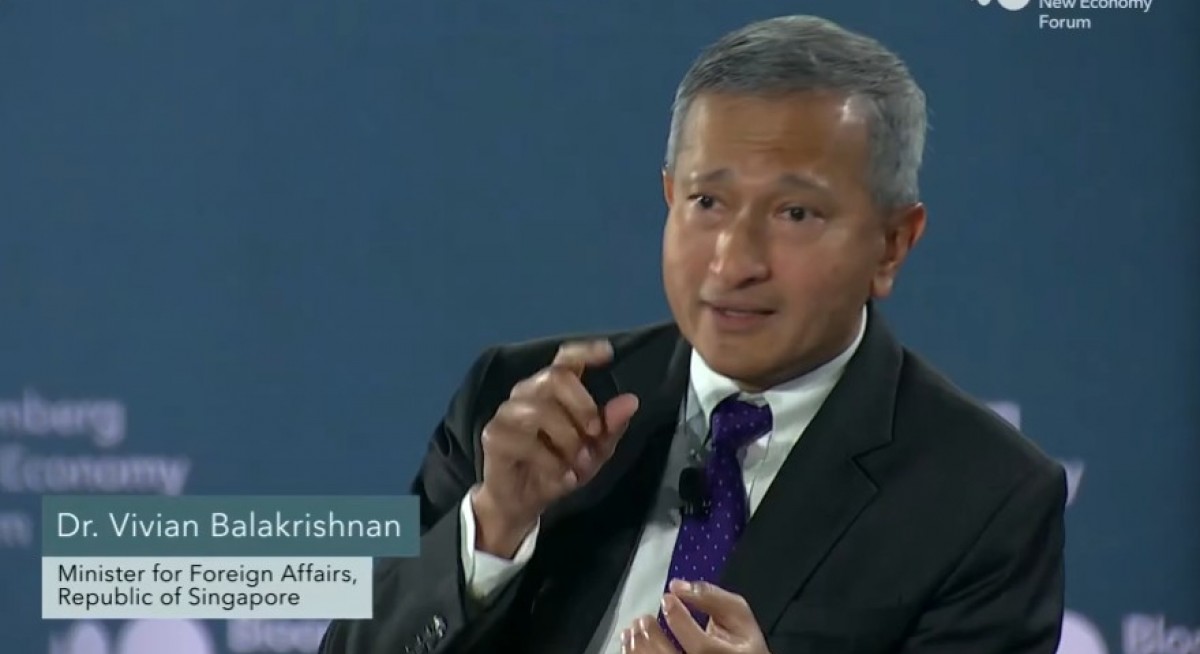“What the US did for eight decades was to provide, first, the market; second, technology; [and] third, capital and rules-based economic integration. The first beneficiary of that, apart from Europe, was Japan, and then you had the Asian Tigers — Hong Kong, Korea, Singapore — and then the rest of Southeast Asia. But the real winner of rules-based free trade has actually been China,” says Balakrishnan at the Bloomberg New Economy Forum 2025 on Nov 19.
The re-election of US President Donald Trump is one expression of these growing pressures. “It is a completely legitimate question for the American voter to say: ‘Wait a minute. Why should we underwrite in blood and treasure this system which seems to have profited the rest of the world?’” adds Balakrishnan.
The US has never met a peer competitor with the “scale, ability and willingness” to reorder the world “in a way that’s favourable to it”, says Balakrishnan. China, however, is “still a middle-income country”, he adds, and “is not able or willing to replace the US as the underwriter of globalisation”.
Trump ‘remarkably consistent’
See also: ‘Remote possibility’ that USD loses reserve currency status: GIC CEO
Trump has been “uniquely consistent for decades”, says Balakrishnan, citing an 1988 interview with Oprah Winfrey that resurfaced and went viral earlier this year.
“His views on war — anti war — his views on free trade — that it’s an avenue for America to be taken advantage of — his views on business — in a Main Street, real estate way, as opposed to Wall Street and financial engineering. His views on immigration actually have been remarkably consistent, and I think people don’t give enough marks for that point,” adds Balakrishnan.
Trump may be consistent, but his methodology and presentation “is somewhat novel”, says Balakrishnan, “and people react to that”. “My point is: American policy under President Trump, in fact, is reflecting long-held, deep convictions.”
See also: HSBC CEO sees fragmented world with more strategic assets
No trust
The fundamental problem with the US and China is an almost complete lack of strategic trust, says Balakrishnan. “That means each side has to assume the worst of each other, and even if you’re taking precautions, it’s viewed as escalatory.”
Balakrishnan warns that the “weaponisation of everything” — from the US dollar to finance, critical minerals to global supply chains — applies also to diplomacy.
“For every action, there’s an equal and opposite reaction. The weaponisation of everything has led to an erosion of trust, has led to a need to assume the worst and to prepare for it, and in the absence of trust, it’s very hard to actually have strategic alignment,” he adds.
Another casualty is weakening supply chains. During the outbreak of Covid-19, the world realised that even manufacturing face masks — “which is not rocket science” — threw countries into a panic, says Balakrishnan.
“The fracturing of supply chains in the name of national security and in search of resilience actually means a world which hitherto has been based on efficiency is now building supply chains on the basis of near-shoring, onshoring [and] friend-shoring,” he adds. “Economically, what that must mean is some inflation, because you’re no longer choosing the cheapest and the best [or] most efficient; you’re now having other considerations. So, watch that bout of inflation.”
The third impact is on the global commons. The Paris Agreement, a legally binding international treaty on climate change signed in 2015, came about because the US and China “were on the same side and were able to drag the rest of us [into] an imperfect but important agreement”, says Balakrishnan.
To stay ahead of Singapore and the region’s corporate and economic trends, click here for Latest Section
“My worry is that we’re going to be unable to deal with the global commons — it means climate change, pandemics, the challenges from Ai, we won’t be able to respond adequately to it because the two key players either are disrupting actively or are spoiling for a fight and are certainly not willing to restrain themselves with multilateral rules imposed by Lilliputian countries… I hope that’s not too depressing,” he adds.
EU must ‘get a grip’
The European Union (EU) is not operating on a sustainable model, says Balakrishnan. “The world has had unsustainable imbalances for some time. If you outsource all manufacturing to China, you outsource all energy to Russia and you outsource security to America — I’m referring to the EU.”
If the EU wishes to have strategic autonomy or independence, it must “get a grip” on its manufacturing, industrial capacity, defence and energy policies, he adds.
In a matter of years, China became the manufacturing centre of the world and enjoyed economies of scale. But this has led to accumulating trade surpluses. “For a while, the Western consumer enjoyed low inflation, low interest rates and high-quality goods at affordable rates, but actually [they] were consuming beyond what they were producing,” says Balakrishnan. “We should not be surprised that this system based on imbalance was not sustainable.”
How would such an imbalance reach equilibrium? If the US shuts its market to the productive capacity of China and the EU follows suit, will China be able to expand its domestic consumption to match its capacity, or will it still try to export its way out? If it does, where will it export to?
“Without being pejorative or making value judgments, just ask yourself, do you need domestic changes to the economic structure of China? I think we do,” says Balakrishnan. “What does Southeast Asia, Africa and South America want? Do we need infrastructure? We do.”
Watch this space, says Balakrishnan near the end of a half-hour chat with Stephanie Flanders, Bloomberg News’ head of economics and government. “I am sure adjustments will occur, both domestically and across borders… The opportunity will be to try to catch these waves, catch these new tides and winds, so that we maximise opportunities for the rest of us.”




